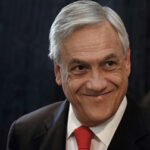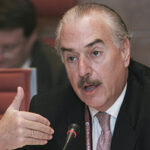Since January 2014, with the support of the European Union, the Club de Madrid has engaged through dialogue with Haitian political, economic and social actors in order to address and facilitate in-depth reflection on long-term priorities such as strengthened democratic institutions and social cohesion. In 2015, Haiti will hold the most complex and large-scale electoral process of its history. The success of 3-year delayed presidential, legislative and local elections will be crucial to resume political and institutional stability. Repeatedly, the Club de Madrid has called for fair, transparent and inclusive elections this year. In the context, the Club de Madrid organized, in collaboration with IDEA International in Haiti, a full day workshop on “Electoral Manifestos and Political Communications”.
Click in this link to see the pictures from this fifth Club de Madrid / EU mission to Haiti
Sebastián Piñera and Andrés Pastrana, former presidents of Chile and Colombia respectively and Members of the Club de Madrid, along with South African Ambassador Ebrahim Rasool, presented lessons learned in their own countries and respective political parties to Haitian political actors on how to elaborate electoral manifestos and how to communicate them to their constituencies. They all highlighted messages regarding the elections as an opportunity to spread democratic ideas and values, and to contribute to strengthening institutions such as political parties. Quality electoral manifestos contribute to the quality of elections, and enable voters to understand what is at stake and what they will be called to decide upon.
Check out Ebrahim Rasool’s 10 steps plan to create an electoral manifesto
See international electoral expert Kristen Sample’s 8-step approach to electoral programms
Furthermore, citizens have the right to know what politicians intend to do once elected. In this sense, the electoral period provides the opportunity to political parties and candidates to look ahead and present a long-term vision for national development, along with sound flagship proposals. All of the speakers highlighted that the manifesto should be realistic, both in terms of implementation and budget, and provided advice on the different steps required to develop a manifesto, including inclusive consultation. Running through all of the presentations was the theme of campaign ethics, and how this reflected in accountability and truth-telling. Eighty leaders from nineteen political parties attended the workshop held on May 26th.
Club de Madrid’s V High-Level Mission included bilateral meetings with President Martelly and former Presidents Jean-Bertrand Aristide and René Préval, as well as the President of the Provisional Electoral Council (CEP) Pierre-Louis Opont, in order to assess progress being made towards elections, as well as to address democratic consolidation challenges beyond the elections
***
The Club de Madrid is the world´s largest, independent group of democratic, political leaders, committed to addressing the challenges of democratic transition and consolidation. The principal added value of the Club de Madrid is a membership of more than 100 democratically elected former Presidents and Prime Ministers, from 70 countries, willing and able to share their diverse expertise, experience and networks in support of democratic values.
The European Union is a major donor of development and humanitarian assistance world-wide. In Haiti, the EU has allocated € 889 million since 2008. Support to good governance, democracy, rule of law and respect for human rights lie at the heart of the EU’s cooperation with Haiti.


